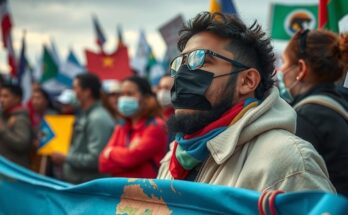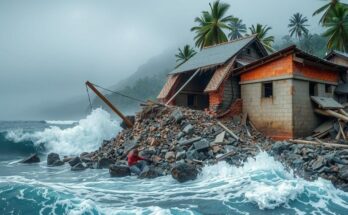On December 5, 2024, the ICJ hearings emphasized that developing nations should not bear the negative impacts of climate change primarily caused by industrialized countries. Nations like the Solomon Islands, India, and Iran called for equitable action and adherence to financial commitments made by developed countries to assist less affluent nations in mitigating climate change impacts. The discussions focus on the legal obligations of member states and the need for robust international cooperation.
On December 5, 2024, the International Court of Justice (ICJ) in The Hague continued hearings addressing the responsibilities of UN member nations regarding climate change and environmental protection. Countries such as the Solomon Islands, India, and Iran articulated a unified stance: the repercussions of climate change must not disproportionately fall on developing nations, which have contributed negligibly to historical emissions.
The representatives of these nations emphasized that climate change is a global challenge requiring coordinated efforts. The Solomon Islands underscored the connection between climate justice and human rights, calling for immediate global action to safeguard the rights of vulnerable populations affected by climate impacts. In response to Vanuatu’s request, the UN General Assembly has sought an advisory opinion from the ICJ on the legal responsibilities of member states in mitigating climate change. Although the opinion will not have enforceable power, it will outline the obligations of nations that have inflicted significant harm, particularly upon small island developing states.
India highlighted the critical nature of global cooperation based on equity and the principle of Common but Differentiated Responsibilities and Respective Capabilities (CBDRRC). India’s representative cautioned against any interference that might jeopardize the developmental goals of nations experiencing significant economic challenges. Similarly, Iran supported the call for equitable treatment of developing countries, emphasizing that genuine and effective climate measures depend on the removal of existing barriers to collaborative efforts.
A poignant plea was made by the Solomon Islands, where Attorney General John Muria, Junior, articulated the dire consequences of rising sea levels on their nation, stressing that climate justice is a legal and ethical obligation for industrialized countries.
Recognizing the critical importance of these discussions, India’s Luther Rangreji addressed the uneven impact of climate change. Rangreji argued that developed nations, while responsible historically for the majority of emissions, possess the necessary resources to tackle climate challenges yet insist that developing nations restrict their energy consumption. He asserted, “Climate finance is not charity; it is an obligation.” Furthermore, India brought attention to unmet financial commitments made by developed nations, notably the $100 billion annual climate finance pledge, which remains largely unfulfilled.
Iran’s representative, Sayyid Ali Mousavi, reiterated the principles of CBDRRC and stressed that any unilateral economic measures imposed by wealthy nations hinder the transfer of vital resources to developing states. He reaffirmed the necessity for developed countries to lead efforts in emission reduction while also supporting developing nations through financial aid, technological advancements, and capacity-building initiatives.
This ongoing dialogue is critical to establishing a sustainable, equitable response to climate change, with all involved parties acknowledging historical responsibilities to ensure a balanced approach to mitigation and adaptation.
The discussions taking place at the International Court of Justice highlight the growing tensions surrounding climate finance and responsibilities among nations. Developing countries, which are often the most affected by climate change despite contributing the least to the problem, are asserting their rights to financial support and technological assistance from industrialized nations. This situation is exacerbated by the historical context of emissions, where developed countries have significantly contributed to global greenhouse gas emissions over many decades. The outcomes from these hearings aim to clarify international legal obligations surrounding climate action, especially concerning the vulnerable populations of small island developing states and other developing nations that face existential threats due to climate change.
The hearings at the ICJ underscore the urgent need for a global commitment to climate justice, with a particular focus on the responsibilities of developed nations toward developing countries. The presentations from the Solomon Islands, India, and Iran illustrate a unified call for equity in climate action and the fulfillment of financial commitments. These discussions are pivotal for shaping effective international climate policies and ensuring that those most impacted by climate change receive the support they rightfully deserve.
Original Source: www.ipsnews.net




